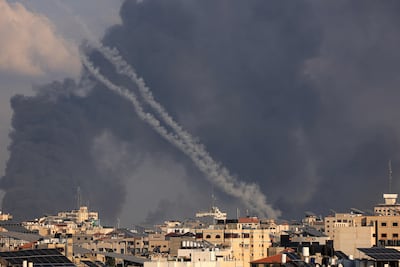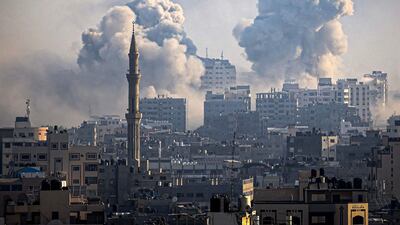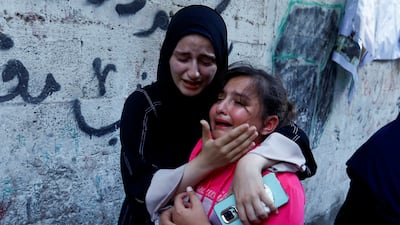Just as the world was settling down, uncertainty has returned with a vengeance.
Yes, there is a war in Ukraine, but it is approaching its 600th day. Economies have long ago put in mechanisms to cope. Same with Covid. Old news in most places.
Inflation, cost of living. They’re being tackled, if somewhat hesitatingly.
But the Israel-Hamas conflict, this is throwing everything into the air, and then some.
Tellingly, the markets are stunned. Sure, there are the predictable, knee-jerk responses. Gold, the usual safe haven, is climbing, as are oil prices and defence stocks. Airline shares are falling. Significantly, that’s all there is. Not much else is moving, and as for forecasters they are saying little.
That’s because they don’t know what to say, what to do. Best to remain silent and do nothing at all in that case.
Right now, they can’t see an end. It may turn into something much bigger, wider and prolonged, with far-reaching consequences. Nobody knows.
Economy-wise, Israel is not Ukraine, it’s not a grain store for the rest of the world. It does not possess large fossil-fuel resources, although Israel and the Eastern Mediterranean region harbour ambitions for the Tamar offshore field to become a hub for natural gas exports to Europe.
Bring in Iran into the conflagration, however, and the likely fallout dramatically escalates. Then, oil supplies and the passage of tankers through the pivotal Strait of Hormuz are impacted. The position of Saudi Arabia, seemingly near to reaching a normalisation accord with Israel, is severely challenged. US, Russia, China, what parts will they play?
Across the City, Wall Street, Dubai and the other financial centres, investment analysts are reduced to watching, same as most people. Any glimmer of so-called intelligence is seized upon; a scintilla of a clue, a hint, is grabbed and pored over, and almost certainly hyped and oversold.

What it all means in the immediate term is inaction. Prior to the Hamas attack, there was a shortage of corporate deals. Mega-takeovers, mergers, investment announcements, new ventures, IPOs – they were few and far between. At a London party last week attended by City leaders, just as the terrorists were finalising their horrific plans, there were moans about the lack of big-ticket mandates. Those that are in the pipeline are going to be staying there for some time; no one faced with such potential unpredictability and volatility wants to commit.
Central bankers were already preoccupied with trying to bring inflation down, a fight they were just about winning, but one that was by no means over. Again, the likelihood of them relaxing the tight pressure has been put on hold.
As the IMF says in its latest World Economic Outlook, released just this week, inflation remains stubbornly above target in a whopping 93 per cent of economies that have set the goal of bringing it down. In "most cases", says the IMF, inflation will not return to its desired level until 2025 at the earliest.
The report was prepared before Hamas fired its first rocket salvos and began tearing holes in the security cordon. What does it mean, even more so with events in Israel? Interest rates are unlikely to be dipping anywhere any time soon, and global growth will bumble along the bottom.
Meanwhile, the high cost of international borrowing has continued to push up bond yields and provoke instability in the bond markets. That, in turn, has led to jitters about banks’ exposure and the possibility of further collapses after Silicon Valley Bank, which went under this year, causing a crisis that engulfed the once mighty Credit Suisse.

The IMF provides little reassurance. Put simply, the world was not in a buoyant place financially before Hamas struck. It certainly isn’t now.
The US is one of the few large economies to have its growth forecast upgraded by the IMF, to 2.1 per cent in 2023 and 1.5 per cent in 2024. By contrast, the eurozone has gone in the reverse direction, cut to 0.7 per cent growth this year and 1.2 per cent in 2024. Once Europe’s muscular powerhouse, Germany is suffering, its output is predicted to fall 0.5 per cent in 2023, before rising by a measly 0.9 per cent in 2024. Not that the UK is faring much better: it is just avoiding flat lining, with the IMF saying the country’s economy will expand by just 0.5 per cent in 2023 and 0.6 per cent in 2024.
As for Israel itself, the economic damage from the attacks is being contained. The Bank of Israel is selling $30 billion of reserves to prop up the shekel after its currency fell to a seven-year low. The bank has about $170 billion of foreign currency holdings left, which should be ample.
The shekel was already one of the worst performing major currencies, down by more than 10 per cent against the dollar, mostly due to concerns about the ability of the government to impose itself on a resistant judiciary. While those worries have evaporated in the face of urgent domestic calls for national unity, the longer-term economic loss to Israel is one of opportunity. Hamas hit just as anticipation was building for a trading bonanza in the years to come between Israel and Saudi Arabia. Presumably, that closer link is similarly consigned to the back burner.
While there is sabre-rattling by the major powers, the fact is that should the Israel-Gaza war widen, none of them is in strong shape economically to intervene. The US is struggling to reduce inflation, Russia is consumed by attempting to win a drawn-out war and trying to combat sanctions, China is still feeling its way gingerly from the Covid crisis and its weak property market has undermined consumer confidence.
The key message from the markets, then, is sit tight. Stay calm, if that is possible, and hope and pray.















































